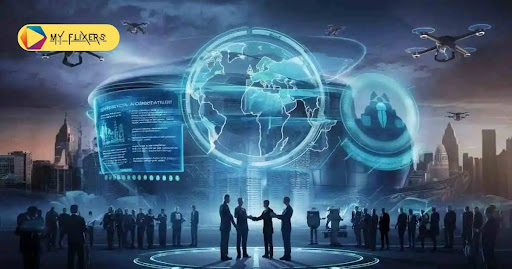Technology giants wield unprecedented influence over global security in today’s interconnected world. From safeguarding our data to shaping international cybersecurity policies, these corporate behemoths have become the unseen guardians of our digital lives. But how did we get here, and what does this mean for the future of global security? Let’s dive deep into the complex web of technology, power, and security that defines our modern era.
The Rise of Technology Giants
Growth of Companies Such as Google, Amazon, Facebook, Apple, and Microsoft
The story of how tech giants came to control global security begins with their meteoric rise to power. What started as garage startups and dorm room projects have evolved into some of history’s most valuable and influential companies. Let’s take a closer look at their journey:
- Google: From a search engine to a multi-faceted tech powerhouse
- Amazon: Transforming from an online bookstore to the “everything store” and cloud computing leader
- Facebook: Evolving from a college social network to a global communications platform
- Apple: Transitioning from personal computers to revolutionary mobile devices
- Microsoft: Adapting from software giant to cloud computing and AI leader
These companies didn’t just grow; they exploded onto the global stage, reshaping entire industries. Their rapid expansion brought unprecedented access to data, computing power, and international reach – critical ingredients in the recipe for security influence.
How Have These Entities Expanded Beyond Their Original Business Models?
The tech giants’ journey from their original business models to security powerhouses is a testament to their adaptability and foresight. Here’s how they’ve expanded:
- Google: Beyond search, Google now offers cloud services and AI research, and it even dabbles in hardware with its Pixel phones and Nest smart home devices.
- Amazon: AWS (Amazon Web Services) has become the backbone of much of the internet, powering everything from Netflix to the CIA’s cloud infrastructure.
- Facebook: With acquisitions like WhatsApp and Instagram, Facebook (now Meta) controls vast global communication channels.
- Apple: The iPhone maker has become a champion of user privacy, positioning itself as a guardian against data breaches.
- Microsoft: Azure, its cloud platform, competes directly with AWS to provide secure infrastructure for businesses and governments.
This expansion has placed these companies at the forefront of global security discussions, often with more resources and reach than many nation-states.
Areas of Influence Where Technology Giants Control Global Security

Data Security
Data is the new oil in the digital age, and tech giants are the latest oil barons. They collect, store, and process unfathomable amounts of personal and corporate data, which puts them squarely in the crosshairs of global security concerns.
Critical aspects of data security influenced by tech giants:
- Encryption standards
- Data storage practices
- Cross-border data transfer policies
- User privacy controls
“With great data comes great responsibility.” This is a modern twist on a classic quote that encapsulates the tech giant’s role in data security.
Cybersecurity
As custodians of vast digital ecosystems, tech giants play a crucial role in global cybersecurity. They’re often the first line of defence against cyber threats, from everyday phishing attempts to sophisticated state-sponsored attacks.
Tech giants’ cybersecurity initiatives:
Company Initiative
Google Project Zero – Identifying zero-day vulnerabilities
Microsoft Digital Crimes Unit – Combating cybercrime
Amazon AWS Shield – DDoS protection service
Apple Bug Bounty Program – Rewarding security researchers
Facebook ThreatExchange – Sharing threat intelligence
These initiatives protect their systems and set standards for the entire industry.
Surveillance
The role of tech giants in surveillance is the most controversial aspect of their influence on global security. Their technologies enable unprecedented levels of monitoring, raising serious privacy concerns.
Surveillance capabilities:
- Facial recognition technology
- Location tracking
- Communication interception
- Behavioural analysis
While these capabilities can enhance security, they pose significant risks if misused. The balance between security and privacy remains a hotly debated topic.
Role of Tech Giants in Influencing Global Security Policies and Practices

Influencing Security Policy
Tech giants don’t just follow security policies; they actively shape them. These companies have become influential voices in security policy discussions through lobbying efforts, public statements, and direct engagement with policymakers.
Case Study: Apple vs. FBI
In 2016, Apple famously refused to create a backdoor for the FBI to access an iPhone used by a terrorist. This standoff highlighted the power of tech giants to influence national security debates and set precedents for digital privacy.
Shaping Cybersecurity Standards
As the primary developers of the technologies we use daily, tech giants are crucial in setting cybersecurity standards. Their choices in implementing security features often become de facto industry standards.
Examples of tech giant-led security standards:
- Two-factor authentication
- End-to-end encryption
- Secure boot processes
- Automatic security updates
Global Security Practice
The global reach of tech giants means their security practices have worldwide implications. When Google updates its security protocols, it affects billions of users across the globe, giving these companies unprecedented influence over global security practices.
Global impact of tech giants’ security practices:
- Influencing National Cybersecurity Strategies
- Setting benchmarks for corporate security practices
- Driving innovation in security technologies
- Shaping public perception of security threats
FAQs
How do technology giants influence global security?
Technology giants influence global security by controlling vast data repositories, developing cutting-edge security technologies, and shaping public policy. Their international reach allows them to implement security measures that affect billions of users worldwide.
What are the ethical concerns associated with the role of tech giants in global security?
Key ethical concerns include:
- Privacy violations
- Monopolistic control of digital infrastructure
- Lack of democratic oversight
- Potential for abuse of power
Can technology companies keep our data safe?
While tech giants invest heavily in data security, no system is 100% secure. However, these companies often have resources and expertise that make them better equipped to protect data than many other organizations.
What is the role of technology giants in cybersecurity?
Tech giants play multiple roles in cybersecurity:
- Developing security technologies
- Identifying and patching vulnerabilities
- Sharing threat intelligence
- Educating users on best practices
What is the concept of global security?
Global security refers to the measures taken to ensure the safety and stability of the international community. In the digital age, this increasingly involves cybersecurity, data protection, and the management of technological risks.
Conclusion
As we’ve explored, technology giants have become central players in the global security landscape. Their influence extends from the data on our phones to the policies of nations. While their role brings significant benefits in innovation and protection against cyber threats, it also raises important questions about privacy, accountability, and the concentration of power.
Moving forward, it’s crucial that we as a society engage in ongoing dialogue about the role of tech giants in global security. We must strive for a balance that harnesses the benefits of technological innovation while safeguarding individual rights and democratic principles.
In this new era where code can be as powerful as armies, the decisions made in Silicon Valley boardrooms may be as consequential as those made in the halls of government. As citizens of the digital age, staying informed and engaged in these issues is not just a right but a responsibility.

